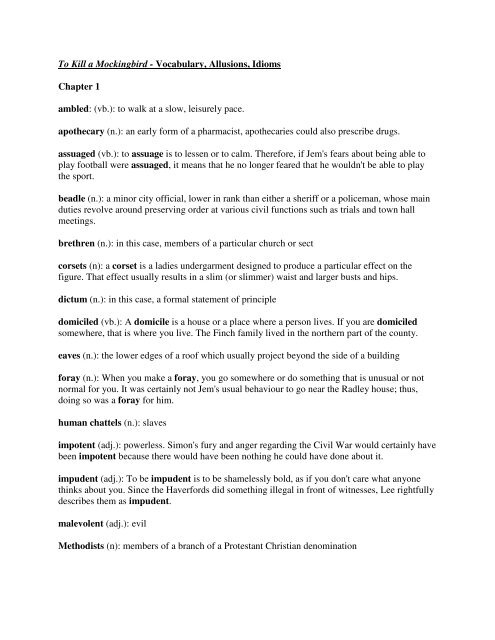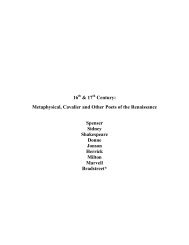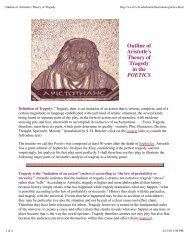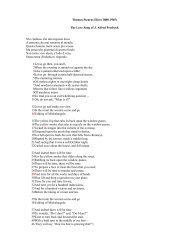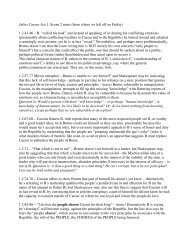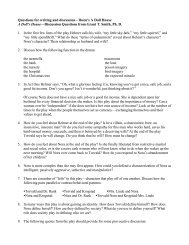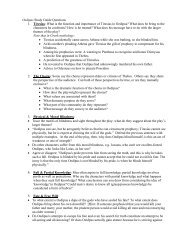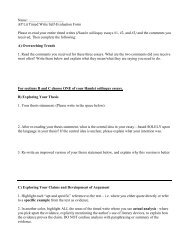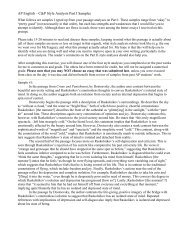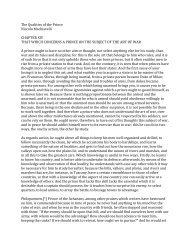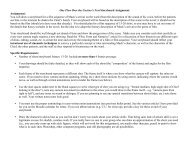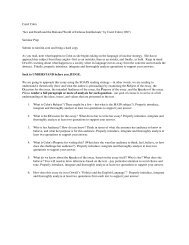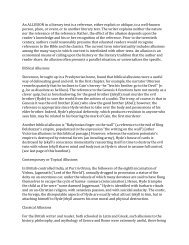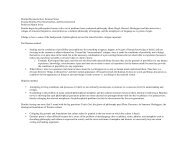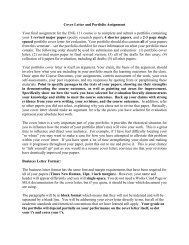Vocabulary, Allusions, Idioms Chapter 1 ambled
Vocabulary, Allusions, Idioms Chapter 1 ambled
Vocabulary, Allusions, Idioms Chapter 1 ambled
You also want an ePaper? Increase the reach of your titles
YUMPU automatically turns print PDFs into web optimized ePapers that Google loves.
To Kill a Mockingbird - <strong>Vocabulary</strong>, <strong>Allusions</strong>, <strong>Idioms</strong><strong>Chapter</strong> 1<strong>ambled</strong>: (vb.): to walk at a slow, leisurely pace.apothecary (n.): an early form of a pharmacist, apothecaries could also prescribe drugs.assuaged (vb.): to assuage is to lessen or to calm. Therefore, if Jem's fears about being able toplay football were assuaged, it means that he no longer feared that he wouldn't be able to playthe sport.beadle (n.): a minor city official, lower in rank than either a sheriff or a policeman, whose mainduties revolve around preserving order at various civil functions such as trials and town hallmeetings.brethren (n.): in this case, members of a particular church or sectcorsets (n): a corset is a ladies undergarment designed to produce a particular effect on thefigure. That effect usually results in a slim (or slimmer) waist and larger busts and hips.dictum (n.): in this case, a formal statement of principledomiciled (vb.): A domicile is a house or a place where a person lives. If you are domiciledsomewhere, that is where you live. The Finch family lived in the northern part of the county.eaves (n.): the lower edges of a roof which usually project beyond the side of a buildingforay (n.): When you make a foray, you go somewhere or do something that is unusual or notnormal for you. It was certainly not Jem's usual behaviour to go near the Radley house; thus,doing so was a foray for him.human chattels (n.): slavesimpotent (adj.): powerless. Simon's fury and anger regarding the Civil War would certainly havebeen impotent because there would have been nothing he could have done about it.impudent (adj.): To be impudent is to be shamelessly bold, as if you don't care what anyonethinks about you. Since the Haverfords did something illegal in front of witnesses, Lee rightfullydescribes them as impudent.malevolent (adj.): evilMethodists (n): members of a branch of a Protestant Christian denomination
picket (n): a pointed or sharpened pole or stake. Many pickets held together can make a picketfence.piety (n): devotion to religious duties and practicespredilection (n.): a predilection is a preference, or a preferred way of doing something. Thus,the Radley's preferred way of spending a Sunday afternoon was to keep the doors closed and notreceive visitorsramrod (adj.): rigid, severe, straightrepertoire was vapid: (n. + adj.): a repertoire is all the special skills a person has; vapid, in thiscase, means boring or uninteresting. So, when Scout says that their repertoire was vapid, shemeans that the games they had invented to pass the time had become old and had lost theirinterest.scold (n.): A scold is a person who scolds; that is, someone who often finds fault with people orthings (and usually lets you know about it under no uncertain terms)spittoon (n.): a jarlike container to spit into; usually used to spit tobacco juice into.strictures (n.): conditions or rulestaciturn (adj.): almost always silent. Apparently, Aunt Alexandra's husband was a very quietman.unsullied (adj.): something that is unsullied has been basically untouched or unused. The factthat Atticus's edition of the Code of Alabama is unsullied would, in this case, indicate that heseldom consults this book.veranda (n): a portico or porch with a roof<strong>Chapter</strong> 2auburn (adj.): reddish-browncatawba worms (n.): catawba worms are actually caterpillars that are highly prized byfishermen in the Southern United States.condescended (vb.): To condescend is to agree to do something that you believe to be beneathyour dignity. Jem condescends to take Scout to school, even though, as a fifth-grader, he feelssuperior to his first-grade sister.covey (n.): a group
crimson (adj.): blood-redcunning (adj.): In this case, cunning means attractive or cute -- almost too cuteentailment (n.): a legal situation regarding the use of inherited property.hookworms (n.): a type of parasite. Hookworms usually enter the body through bare feet andmove through the body to the small intestines where they attach themselves with a series ofhooks around their mouths.immune (adj.): In this case, to be immune to something means that it has no effect on you. Thestory Miss Caroline reads to the class has no effect on them; they don't get it.indigenous (adj.): belonging to a particular region or countryscrip stamps (n.): paper money of small denominations (less than $1.00) issued for temporaryemergency use. During the Great Depression, many local and state government gave out scripstamps, or sometimes tokens, to needy people.seceded (vb.): To secede is to break away. During the Civil War, Alabama was one of the statesthat broke away, or seceded from the Union.smilax (n.): a bright green twinning vine, often used for holiday decorations.sojourn (n.): a brief visitsubsequent mortification (adj. + n.): Something that is subsequent will follow closely aftersomething else. Mortification is a feeling of shame or the loss of self respect. If Scout had beenable to explain things to Miss Caroline, she could have prevented her teacher from losing selfrespect of feeling shameful later on.vexations (n.): To vex is to annoy, so a vexation is something that causes annoyance orproblems.wallowing illicitly (vb. + adv.): In this case, to wallow is to indulge in something (usually anactivity) with great enjoyment. Illicit, used like this, means unauthorized or improper. Afterlistening to Miss Caroline, Scout feels that, by reading, she has been happily indulging insomething which she should not have been doing.<strong>Chapter</strong> 3amiable (adj.): friendlycompromise (n.): an agreement where each person agrees to give up something
contemptuous (adj.): To be contemptuous is to have the feeling that someone or something isbeneath you; that it or they are worthless. The Ewell boy obviously feels this way about histeacher, Miss Caroline.contentious (adj.): always ready to argue or fightcootie (n.): a slang term for a head louse. A louse (plural: lice) is a bloodsucking parasite.cracklin bread (n.): a type of cornbread mixed with cracklins (bits of fried pork skin).diminutive (adj.): smaller than ordinarydisapprobation (n.): disapprovaldiscernible (adj.): understandabledispensation (n.): a release from an obligation or promise. In this case, by offering friendship toWalter and promising that Scout won't fight with him, Jem dispenses her threat to fight with himmore.dose (of) magnesia (n. + n.): A dose is an exact amount of medicine. Magnesia is a medicineused as a laxative and antacid.eddy (n.): a current of water that moves against the main current; a whirlpoolerratic (adj.): irregular. Calpurnia usually uses good grammar, but when she is angry, hergrammar is irregular.flinty (adj.): Flint is a very hard rock. Something that is flinty is extremely hard and firm.fractious (adj.): mean or crossgravely (adv.): seriouslyhaint (n.): a ghost or spook; someone or something very scaryirked (v.): to be irked is to be annoyed. Scout is annoyed when Jem tells Walter that she won'tfight with him (Walter) anymore.kerosene (n.): a thin oil. Kerosene is sometimes used as a solvent or cleaning agent, although itsmore common use is for fuel or lighting.lye soap (n.): Lye is a very strong alkaline substance used for cleaning. Lye soap is very strong,harsh soap that contains lye.
monosyllabic (adj.): Mono means "one." A syllable is word or a part of a word which can bepronounced with a single, uninterrupted sound. The name "Atticus," for example, is made up ofthree syllables: at + ti + cus. Thus, monosyllabic literally means "one sound." Scout'smonosyllabic replies to Atticus's questions about her first day at school might have been madeup of one-sound words like "yes" and "no."mutual concessions (adj. + n.): A concession is an agreement; something that is mutual is doneby two or more people. Thus, a mutual concession occurs when two or more people agree onsomething.onslaught (n.): a violent attackpersevere (v.): to carry on in spite of difficultiestranquility (n.): peacefulness; serenity<strong>Chapter</strong> 4auspicious (adj.): favourablemelancholy (adj.): sad and gloomyquelling (of) nausea: (v. + n.): To quell something is to quiet or pacify it. Nausea is the feelingyou get when your stomach's upset and you feel as if you're about to vomit. Scout is trying toquell her nausea, or make her stomach settle down.scuppernongs (n.): a sweet table grape, grown chiefly in the Southern United States.<strong>Chapter</strong> 5asinine (adj.): stupid; sillybenevolence (n.): in this case, a generous or thoughtful giftbenign (adj.): kind and gentlebridgework (n.): Unlike dentures, which replace the upper or lower sets of teeth, bridgework ismade up of sections of replacement teeth that can be inserted and removed from one's mouth.chameleon (adj.) In nature, chameleons are tree-dwelling lizards that have the unusual ability tochange the color of their skin in order to blend into their surroundings. By calling Miss Maudie a
chameleon lady, Scout points out the fact that her neighbour's appearance was as changeable asone of the lizards.cordiality (n.): sincere affection and kindnessedification (n.): education; instructiongaped (vb.): To gape at someone is to stare at that person with your mouth open.inquisitive (adj.): questioning; pryingmimosa (n): Also called a silk tree, a mimosa can be either a tree or a shrub.morbid (adj.): gruesome; horribleplacidly (adv.): calmly; quietlyProtestant (adj.): Protestant is the name applied to any number of Christian churches, such asBaptist, Methodist, and Lutheran.pulpit Gospel (adj. + n.): A pulpit is the raised platform or lectern from which a preacher speaksin church. The Gospel refers to the teachings of Jesus Christ, specifically the first four books ofthe New Testament. Scout says that her faith in what she's heard about the teachings of Christfrom the pulpit (preacher) in her own church has been shaken a bit.quibbling (vb.): a type of arguing where you avoid the main point by bringing up petty detailstacit (adj.) An agreement, or, in this case, a "treaty" that is tacit is one that has been silentlyagreed upon. Thus, the children know that they can play on Miss Maudie's front lawn eventhough she never directly told them that it was all right to do so.<strong>Chapter</strong> 6collards (n.): a type of cabbage with very coarse leaves. It would be difficult to walk quietlythrough a patch of collards.dismemberment (n.): To dismember someone is to tear or cut that person's limbs (arms andlegs) off. Although it is unlikely that anyone would have actually pulled off Dill's arms and legs,Lee uses the word to point out how outraged Miss Rachel must have been to discover that thechildren had been playing strip poker.eerily (adv.): weirdly; mysteriouslyensuing (adj.): Something that ensues is something that comes immediately after something else.
Franklin stove (n.): a cast iron heating stove, invented by Benjamin Franklin.kudzu (n.): a quick-growing vine with large leaves, often found in the Southern United States.lattice-work (adj.): A lattice is an openwork structure of crossed strips or bars, as in a screen.Light that passes through any kind of a lattice -work would produce lattice-work shadows.malignant (adj.): dangerous; evilprowess (n.): superior ability or skillramshackle (adj.): loose or rickety; about to fall apartrespiration (n.): breathingrigid (adj.): stiffwaning (adj.): becoming less bright, intense, or strong. The moonlight is waning because it'sgetting closer to morning, and the moon is changing its position in the sky.<strong>Chapter</strong> 7cleaved (vb.): stuckgnats (n.): small, two-winged insects that can bite or sting.meditative (adj.): To meditate is to reflect upon something, or think about it. When Jem givethe patch on the tree a meditative pat, he does so in a thoughtful manner.palate (n.): the roof of one's mouthperpetual embalming (adj. + n.): Something that is perpetual lasts forever. Embalming is theprocess of preserving a dead body. As Atticus later says, Jem would do well to get rid of theadjective (perpetual) . The Egyptians invented a type of paper (not toilet paper), as well asembalming (which, by its very nature, is perpetual) .rendered (her) speechless: (vb. + n.): made her unable to speakvigil (n.): a watch. Jem is waiting and watching for Mr. Nathan to appear.whittles (vb.): To whittle is to use a knife to cut away thin shavings of wood. Sometimes, awhittler may actually end up carving a recognizable object.<strong>Chapter</strong> 8
aberrations (n.): an aberration is a deviation, or a moving away from, something that isnormal. The fact that winter comes so quickly in Maycomb is abnormal, thus, an aberration.azaleas (n.): a colorful and decorative kind of flower.cannas (n.): a beautiful tropical flower.caricatures (n.): a representation of a person where certain features of that person areexaggerated or distorted.cordial (adj.): warm and friendlyflue (n.): a channel in a chimney that allows smoke and flames to pass to the outsidemeteorological (adj.): anything to do with meteorology or weather.morphodite (n.): Scout has misheard Miss Maudie, who would actually have said the wordhermaphrodite. Technically, a hermaphrodite is an animal or plant that has both female and malereproductive organs. Of course, the children's snowman is not really a hermaphrodite, but it doeshave both male and female characteristics.near libel (adj. + n.): When you commit libel, you harm someone's reputation. Atticus tells thechildren that they have committed a near libel; that is, their snowman is almost libelous becauseit so closely represents one of their neighbours and could harm that neighbour's reputation.perpetrated (vb.): carried out; committedplaited (vb.): braidedprocured (vb): gotprophets (n.): A prophet is someone able to predict the future.quelled (vb.): To quell is to overwhelm something until it is powerless. The tin roof of MissMaudie's house quelled the flames because tin cannot burn so the fire was eventually stopped.roomers (n.): persons who rent and live in rooms in a house.switches (n.): slender twigs or branchestaffeta (n.): a lustrous, stiff fabric, often used for women's dresses, especially formal weartouchous (adj.) touchy; sensitive
treble (adj.): highunfathomable (adj.): Something that is unfathomable is something that can not be understood.<strong>Chapter</strong> 9ambrosia (n): a desert made up of a mixture of fruits, nuts, and coconut.analogous (adj.): similar; comparableattire (n.): clothingbawled (vb.) cried out noisilybluff (n.): the broad, flat front of a cliffcatwalk (n.): a narrow, elevated walkwaychangelings (n.): a child secretly put in the place of anothercompensation (n.): To compensate means to pay for something or to make up for something.Aunt Alexandra's good cooking skills, in some ways, make up for the fact that, for Scout,spending the holidays with her and Francis is not a lot of fun.constituted (vb.): made upcrooned (vb.): To croon is to sing in a low, gentle tone.deportment (n.): behaviourdim (adj.): unclear; not strongdonned (vb): put ondoused (vb.): to douse someone is to pour liquid, in this case water, all over that person.evasion (n.): To evade is to avoid doing or answering something directly. Uncle Jack's evasionoccurs when he doesn't directly answer Scout's question.fanatical (adj.): A fanatic is a person whose extreme enthusiasm, interest, zeal, etc. goes beyondwhat is reasonable. Aunt Alexandra is fanatical about Scout's clothes because, according toScout, her aunt's interest in this subject goes beyond what is reasonable.gallantly (adv.): politely; in the manner of a gentleman
gastric (adj.): of, in, or near the stomach. A stomach ache would be a gastric complaint.gravitated (vb.): Gravity is, of course, the force that pulls you to earth and keeps you fromfloating into outer space. When you gravitate toward something or someone, you find yourselfbeing pulled in the direction of that object or person.guilelessness (n.): Guile is craftiness and cunning in dealing with other. To be guileless is tohave none of that craftiness. Here, Lee is being ironic since its obvious that Simon Finch didn'ttrust his daughters at all, and planned his house accordingly.harboured (vb.): to hold in the mindhookah (n): An oriental tobacco pipe with a flexible tube that draws smoke through a bowl ofwater.impaired (adj.): damaged; weakenedindecision (n.): When you're indecisive, you can't decide what to do. Scout's indecision revolvesaround whether she should obey Uncle Jack or run away from him.indicative (adj.): Something that is indicative of something shows or displays something. Themanner in which Simon Finch arranged his house showed something about him.ingenuous (adj.): simple; innocentinnate (adj.): Something that is innate is a natural part of something else. To Scout, cuss wordshave a natural sort of attraction to them; an innate attractiveness. They have value all on theirown for her.inordinately (adv.): Inordinate means too great or too many. Cousin Ike Finch is too vain abouthis beard; inordinately vain.invective (n.): Invectives are abusive terms, curses, insults, and/or cuss wordsisolate (vb.): set apart from othersjar (vb.): shake up; disturbjetty (n): a type of wall built out into water to protect a coastline or restrain currentsmishaps (n.): unlucky or unfortunate accidentsmortify (vb.) humiliate; embarrassnocturnal (adj.): nightly
obsess (vb.): greatly preoccupyobstreperous (adj.): noisy and unrulypantry (n.): a small room or closet off the kitchen where foodstuffs and cooking ingredients arestoredporter (n.): a person who carries luggage, etc., in this case, at a railroad station.provocation (n.): To provoke is to excite some sort of feeling; often anger or irritation. UncleJack tells Scout that, as far as cuss words are concerned, he doesn't see the use for them unlessthey are used when one is very angry or provoked to use them.ringworm (n.): a contagious skin disease caused by a fungus.siblings (n.): brothers and/or sistersstill (n.): an apparatus for making alcoholic liquors. The sort of still to which Scout refers wouldbe an illegal one.subdued (vb.): Someone who has been subdued has been soothed or softened and made lessintense.tarried (vb.): delayed; waitedtentatively (adv.): To be tentative is to be hesitant or unsure. Francis asks Scout his questiontentatively because he is unsure as to her reaction and more than a little afraid to face her.tongs (n.): a device used to grab or lift objects. Tongs generally have two long arms that arehinged together.trousseau (n.): all the new clothes a bride brings to her marriageuncompromising lineaments (adj. + n.): Lineaments are distinctive features or characteristics.Uncompromising, in this instance, means unchanging; firm; set. Alexandra's and Francis'suncompromising lineaments are their characteristics that are set and will never change.wary (adj.): To be wary means to be cautious on your guard against something. In this instance,the children were never afraid of or cautious about their uncle's appearance.widow's walk (n.): a platform with a rail around it, built onto the roof of a house.Yankees (n.): Northerners; natives of Northern states. During the Civil War, the Yankees werethe enemies of the South.<strong>Chapter</strong> 10
alist (adj.): tilted to one sidearticulate (adj.): able to speak and express oneselfattributes (n.): characteristics; qualities of a person or thingbout (n.): fightcorncribs (n.): A corncrib is a small structure used to store corn.crook (of his arm) (n.): The crook of your arm is the inside part of your arm where it bends atthe elbow.erratically (adv.): strangely; differently than normalfeeble (adj.): weak; frailgingerly (adv.): carefully; cautiouslyinconspicuous (adj.) To be conspicuous is to attract attention. To be inconspicuous is to do theopposite; to not attract attention. Scout wishes that Atticus would be more inconspicuous; thatis, he would attract less attention to himself.Jew's Harp (n): a small musical instrument that is played by plucking a piece of metal whileholding the instrument to one's mouth.mad dog (adj. + n.): a dog infected with a disease, such as rabies, which makes it act in a crazy,dangerous mannermausoleum (n.): Literally, a mausoleum is a large, imposing tomb (a tomb is a place where deadbodies -- those that aren't buried -- are housed). However, Miss Maudie uses the term in itshumorous form. She refers to her old house as a mausoleum because, to her, it was too large andtoo somber.peril (n.): dangerProvidence (n.): the care of Godrudiments (n.): principles; elements; subjects to be learnedtartly (adv.): sharplytorso (n.): the trunk of a body; that is, the part of the body that does not include the head, legs, orarms
vaguely (adv.): to be vague is to be unclear or not precise<strong>Chapter</strong> 11apoplectic (adj.): Apoplexy is a condition of sudden paralysis; a stroke. To be apoplectic, in thiscase, is to behave as if on the verge of having a stroke.arbor (n): an outdoor area shaded by trees or, in this case, scuppernong vines on a lattice.bedecked (adj.): adorned; covered (with decorations)calomel (n.): a laxative; often used as a cure for intestinal wormscamellia (n.): a shrub with glossy evergreen leaves and waxy, rose-like flowers.camisole (n.) a woman's sleeveless undergarment, usually worn under a sheer blousecommence (vb.): begindecreed (vb): A decree is an official order. As her older brother, Jem decreed what he andScout would do.degradation (n.): a state of low honour or moral characterdog-trot hall (adj.): a covered passageway between two parts of a buildingescapade (n.): reckless prankessence (n.): fundamental nature; most important qualityinfuriated (vb.): angered greatlyinterdict (n.): prohibition; restraintlivid (adj.): pale; lead-colored. Livid can also mean red, as in the color someone's face gets whenthat person becomes angry.oppressive (adj.): overbearing; hard to put up withpalliation (n.): to palliate is to lessen the pain, or, in this case, fear and anxiety, of somethingwithout actually making the fear and anxiety go away. Calpurnia is not a great source ofpalliation; that is, she doesn't make the children feel any less anxious or fearful.passé (adj.): old-fashioned
philippic (n.): a bitter verbal attackplate (n.): dentures; dental platepropensities (n.): inclinations or tendenciesreconnaissance (n.): examinationrectitude (n.): uprightness of characterrelic (n): something of historic interest that has survived from the past. In this case, Scout isreferring to a gun that would have been used in the Civil War.skulked (vb.): to move or slink about in a sinister manner. The children are skulking in thekitchen because they are fearful of Atticus's reaction when he returns home.syringe (n.): a device with a rubber bulb on one end and a narrow tube on the other: used toinject or extract fluids from body cavities.tirade (n.): a long angry speechtranquil (adj.): calmumbrage (n.): offenseundulate (vb.): to move in waves or in a wavy mannerviscous (adj.): sticky<strong>Chapter</strong> 12alien (adj.): not natural; strangeappalling (adj.): shocking; horrifyingasafoetida (n.): a strong-smelling (like garlic) substance made from a parsley-like plant; oftenused in folk medicine to repel illnessaustere (adj.): stern and severeboded (vb.): continuedchurch (vb.): To church someone is to bring a person to church for a special service thatrevolves around that person's needs or deeds.
clad (vb.): dressedcontemptuously (adv.): To behave or speak contemptuously toward someone is to treat thatperson as if he or she is unworthy or beneath one's dignity.contentious (adj.) always ready to arguedenunciation (n.): To denounce is to strongly disapprove of or condemn something. Thedenunciation of sin in the reverend's sermon indicates his strong disapproval of sin.diligently (adv.): industriously; in a hard-working mannerdispelled (vb.): driven awayecclesiastical impedimenta (adj. + n.) items used during a church servicefrivolous (adj.): silly; not seriousgarish (adj.) showy, very bright or gaudyhabiliments (n.): outfits; clothinginconsistent (adj.): not in agreement; incompatibleindignantly (adv.): angrilylilac talcum (adj. + n.): Lilacs are a very fragrant flower. Talcum, often called talcum powder,is a fine talc, or powder, used for the body or face. Lilac talcum is lilac-scented talcum powder.rotogravure print (n.): Rotogravure is a process of printing pictures; often photographs ofpictures. Since rotogravure prints often appeared in newspapers, it is possible that the print inthe church had been taken from a newspaper.snuff (n.): a preparation of powdered tobacco, usually sniffed through the nosetapeworm (n.): a parasite that can live in a person's intestines.voile (adj.): a thin, cotton-like fabric<strong>Chapter</strong> 13caste system (adj. + n.): class distinctions based on birth, wealth, etc.curtness (n.): To be curt is to be brief and short to the point of being rude.
devoid (adj.): completely withoutflighty (adj.): foolish; irresponsibleincestuous (adj.): Incest is sexual intercourse between persons too closely related to marrylegally. Atticus's comment as to the possibility that the Finches might have an Incestuous streakrefers to the fact that so many Finches have married their cousins.irritable (adj.): easily annoyedmandrake roots (n.): The roots of the mandrake plant were often thought to have magicalpowers because it was thought that their shape resembled the human body.myopic (adj): Myopia is an abnormal eye condition, often called shortsightedness. Someonewho is myopic cannot see objects clearly.obliquely (adv.): indirectlyprerogative (n.) exclusive right or privilegeshinny (n.) a slang term for liquor; usually whiskey or bourbon.sluggish (adj.): lacking energy; lazysoberly (adv.): seriouslyspun (v.): To spin a tale is to tell a story in a creative, fanciful way.tactful (adj.): To be tactful is to be able to say the right thing to a person without beingoffensive. Scout realizes that her question about her aunt and uncle was not tactful and may havebeen offensive or, at least, embarrassing.tight (adj.): drunk<strong>Chapter</strong> 14antagonize (vb.): oppose; make angrybushel (n.): a unit of dry measure equal to 32 quartserosion (n.): a gradual wearing away.infallible (adj.): never wrong
manacles (n.): handcuffsneat (adj.): unmixed with anything, such as water or soda; straighttaut (adj.): tightly stretched<strong>Chapter</strong> 15acquiescence (n.): agreement without protestaffliction (n.): in this case, a conditionaggregation (n.): group; gatheringbegrudge (vb.): To begrudge someone something is to feel resentment or disapproval about thefact that they have something. Atticus says that he doesn't think anyone in the town would resentthe fact that he has a client.ecclesiastical (adj.): church-likefaçade (n.): the front of a building; the part facing the street.futility (n.): feeling of being ineffective; uselessness, hopelessnessimpassive (adj.): showing no emotionlinotype (n.): a typesetting machine used in publishing.ominous (adj.): threatening; sinistershinnied up (adj.): drunkstifle (vb.): hold back; suppresssuccinct (adj.): clear and briefuncouth (adj.): crude, unmannerlyvenerable (adj.): impressive on account of age or historic associationsvenue (n.): the place where a jury is selected and a case is tried<strong>Chapter</strong> 16
affirmed (vb.): firmly declared or statedakimbo (adj.): hands on hips and elbows bent outward.circuit solicitor (n.): a lawyer who travels to different locations to prosecute in trialsdispel (vb.): drive awayeccentricities (n.): oddities; unconventionalitieselucidate (vb.): explainfey (adj.): strange; eccentricformidable (adj.): impressiveinhabitants (n.): residentskhaki (adj.): a strong, twilled cloth of a dull yellowish-brown colorMennonites (n.): members of an evangelical Protestant Christian sect. Mennonites favour plaindress and plain living.profane (adj.): not connected with religion or religious mattersruddy (adj.): reddishScripture (n.): The Biblesubpoena (n.): a written legal order directing a person to appear in court to give testimonysubtle (adj.): not openly obvious; quietsundry (adj.): various<strong>Chapter</strong> 17acrimonious (adj.): sarcastic; bitter; nastyaffirmative nod (adj. + n.): Affirmative means positive. To give an affirmative nod would beto nod or shake one's head up and down to indicate "yes."
amber (adj.): dark orange yellowambidextrous (adj.): able to use both hands with equal easeamiably (adv.): good-naturedlyaudibly (adv.): Anything that is audible is capable of being heard. The judge warns thespectators against making any more comments that can be heard.bantam cock (n.): a small, aggressive rooster.benignly (adv.): kindly; gentlyboiling (n.): angry or unruly groupcapacity (n.): abilitycast (n.): To have a cast in one's eye means that a particular eye tends to veer or turn off intoanother direction.complacently (adv.): in a self-satisfied waycongenital (adj.): a congenital condition is one that is in existence at birth. For example, if achild is born with a weak heart, that weakness in congenital; as opposed to someone who mayacquire the condition later in life.contempt charges (adj. + n.) Contempt, in this case, is open disrespect of a court or judge. Aperson who acts in such a manner may face a contempt charge from a judge.corroborating evidence (adj. + n.): In legal terms; corroborating evidence is evidence whichhelps to strengthen a position. For example; eyewitness testimony in regards to a crime would becorroborating evidence that such a crime had been committed.corrugated (adj.): formed by a series of alternating ridges and groovescounsel (n.): lawyerscrepey (adj.): Crepe is a thin, crinkled cloth. Mr. Ewell's crepey neck obviously resembles thisfabric; that is, the skin is thin and crinkled.dictum (n.): official pronouncementdogged (adj.): stubborn determinationeconomic fluctuations (adj. + n.): Economics, in this case, has to do with the economy; thefinancial state of the country and its people. To fluctuate means to change. As far as the Ewells
are concerned, no matter how the economy of the country might change, their situation wasalways the same. They were always poor.edge (n.): sharpnessgardenia (n.): a large, fragrant flower.genially (adv.): in a friendly mannergeraniums (n.): flowering plants.gullet (n.): throat; neckheaved (vb.): liftedimport (n.): importanceinfinite (adj.): endlessirrelevant'n'immaterial (adj.): "irrelevant and immaterial" Irrelevant means not relative; notrelated (to something). Immaterial means unimportant. The judge is saying that whether or notMr. Ewell can read and write is not related and unimportant to the case.load o'kindlin' (n.): "load of kindling." Kindling is generally made up of dry twigs, branches,etc.; materials useful for starting a firenamesake (n.): the person one is named after. In this case, Mr. Ewell's namesake is the leader ofthe Confederate Army, Robert E. Lee.prosperity (n.): good fortune; wealthquelling (vb.): quieting; calmingrefuse (n.): garbageruttin' on (vb.): In this instance, the term is used to indicate that, according to Mr. Ewell, TomRobinson was having sexual intercourse with his daughter. It should be noted that this term isalmost exclusively reserved for use in describing the mating habits of animals, not people.skewed (adj.): turnedslop jars (n.): large pails usually used to receive waste water from a wash basin or the contentsof a chamber potsmugness (n.): To be smug is to be highly self-satisfied; to think a lot of oneself. Mr. Ewell'ssmugness, or appearance of self-satisfaction, shows on his face.
speculations (n.): To speculate is to think about or reflect on a subject. Speculations arethoughts or reflections.sulky (adj.): moody and quietsullen (adj.): in this case, gloomy and threateningsupplemented (vb.): added totenet (n.) a principle or belief generally held to be truetitle dispute (n.): a legal fight over the ownership of a particular piece of propertyturbulent (adj.): stormy; unrulyvarmints (n.): in this case, flies and other flying insects that would be found in and around agarbage dumpwarranted (vb.): gave a reason for; indicated the need for<strong>Chapter</strong> 18arid (adj.): dry; without expressionchiffarobe (n.): a large cabinet with drawers and a place for hanging clothes.constructionalist (n.): a person who interprets aspects of the law in a specified waydusk (n.): the time just before nightfallground-itch (n.): Ground-itch is caused by hookworms. The parasites usually enter the bodythrough bare feet, causing an itchy, allergic reaction.grudging (adj.): hostilelavations (n.): washingsmollified (adj.): soothed; calmedneutrality (n.): the condition of being neutral; not taking part in either side of a controversy.perpetual (adj.): everlasting; continuouspilgrimage (n.): in this instance, a long walk
iled (adj.): angrystrenuous (adj.): work or labour that is strenuous requires a lot of energy and stamina.tedious (adj.): boring; tiresometollable (adj.): Mayella's way of pronouncing the word "tolerable." Someone who is tolerable isa person who is fairly good or passable; someone who can be tolerated or endured.wrathfully (adv.): angrily<strong>Chapter</strong> 19candid (adj.): open and honestex cathdra remarks (adj. + n.): remarks made with the authority that comes from one's officialpositionexpress (adj.): clear; explicit; not just impliedexpunge (vb.): remove completelygrimly (adv.): sternly; without humourimpudent (adj.): disrespectful; boldsubtlety (n.): delicacythin-hided (adj.): thin-skinned; sensitiveunimpaired (adj.): unhurt; undamagedvolition (n.): will. Scout is saying that someone like Tom would never go into somebody's yardon his own or unless he had been invited to do so, and would never do so of his own will orvolition.<strong>Chapter</strong> 20aridity (n.): drynessattentive (adj.): paying attention; observant
calibre (n.): qualitycapital charge (adj. + n.): a charge for a crime that is punishable by deathcorroborative evidence (adj. + n.): To corroborate is to strengthen and support. Corroborativeevidence, in a trial, is evidence that makes a case stronger. Atticus is telling the jury that there isno evidence to strengthen the case against Tom.corrupting (vb.): To corrupt someone is to bring that person down to a lower moral level. Sinceit at first appears that Mr. Raymond has given Dill liquor to drink, it would seem that he iscorrupting him.cynical confidence (adj.): To be cynical, in this case, means to believe that people are onlymotivated in what they do out of selfishness; that no one truly behaves or does something out ofsincerity. Atticus's mention of the witnesses's cynical confidence refers to the fact that they areselfish and self-centred enough to think that everyone will believe their story.detachment (n.): the state of being disinterested or unemotionaldiscreet (adj.): carefully phrased; cautiousfraud (n.): a lie; a deceptionindicted (vb.): formally accused; chargediota (n.): a very small amountminute (adj.): exact; precise (pronounced: my - newt)pauper (n.): an extremely poor personperpetrated (vb.): committedtemerity (n.): foolish or rash boldnessunmitigated (adj.): out-and-out absolute<strong>Chapter</strong> 21acquit (vb.): clear of a charge; find not guiltycharged the jury (vb. + n.): When Judge Taylor charges the jury, he gives them instructions inlaw before they go off to deliberate or decide the case
exhilarated (adj.): cheerful, merryindignant (adj.): angry<strong>Chapter</strong> 22cynical (adj.): a cynic is someone who often belittles or makes fun of someone else. AuntAlexandra tells Dill that his remarks about his own Aunt's drinking habits are cynical, especiallysince, as a child, Dill should have more respect for his elders.fatalistic (adj.): To be fatalistic about something is to accept the event as though it wereinevitable; that is, that nothing could be done to change or alter it.feral (adj.): wild; savageheathen (adj.): unenlightened; without religion or moralsruefully (adv.): regretfully<strong>Chapter</strong> 23commutes (vb.): changes; makes less severedry (adj.): clever but subtlefurtive (adj.): sneakyinfantile (adj.): childishstatute (n.): lawvehement (adj.): full of emotion and strong feelingwary (adj.): cautiouswryly (adv.): humorously; slightly sarcastic<strong>Chapter</strong> 24apprehension (n.): In this case, fear
ellows (n.): a machine that allows air to be pumped through a system; in this case, an organbovine (adj.): cow-likebrevity (n.): shortnesscharlotte (n.): a desert made with fruit in a mold that is lined with pieces of bread or cake.devout (adj.): devoted to religionhypocrites (n.): people who pretend to be something they are notimpertinence (n.): disrespectlargo (adj.): Largo is a direction used in music which means "at a very slow tempo. Mrs.Merriweather is apparently speaking to Scout very slowly.squalid (adj.): miserable; wretchedsqualour (n): filthsulky (adj.): moodyvague (adj.): not clearly felt; somewhat subconsciousyaws (n.): an infectious contagious tropical disease<strong>Chapter</strong> 25roly-poly (n.): a small bug that can roll itself into a ball. Also known as a pillbug, sowbug orwood louse.scowling (vb.): A scowl is a facial expression caused by scrunching up one's forehead and brow;a look of displeasure.veneer (n.): attractive outer surface<strong>Chapter</strong> 26remorse (n.): a feeling of regret and guiltrecluse (n.): someone who stays away from society and the company of others
spurious (adj.): Something that is spurious outwardly resembles something but does not havethe genuine qualities of that thing. Miss Gates thinks that The Grit Paper is spurious because,although it resembles a newspaper, to her mind, it is far inferior to a publication like The MobileRegister or other newspapers.<strong>Chapter</strong> 27industry (n.): work, especially on a steady basisnotoriety (n.): fameflorid (adj.): very flowery in style; elegantnondescript (adj.): dull; with no special or interesting qualitiescarcass (n.): bodyeccentricities (n.): odd behaviourmaiden ladies (adj. + n.): women who have never married<strong>Chapter</strong> 28boil-prone (adj.): A boil is an inflamed, pus-filled swelling on the skin, like a pimple onlyusually bigger. To be prone to something is to be inclined to it. If the children had been boilprone,they would have been inclined to have a lot of boils.climbers (n.): social climbers; people trying to move into a different social classcrap games (n.): a gambling game played with two dicedivinity (n.): a white fudge made from whipped egg whites, sugar, and nuts.forest primeval (n. + adj.): in this instance, a forest that had been primarily untouched orunchanged by manfurtive (adj.): secretgait (n.): pace, walk
hock (n.): the joint bending backward in the hind leg of an animal like a pig. Scout is dressed asa ham, and a ham is the upper part of a hog's hind leg, Scout's hock would be the part of hercostume that resembles the joint of a pig's leg.irascible (adj.): angrymocker (n.): mockingbirdpinioned (adj.): confined; held downrepertoire (n.): accomplishments; skills. The repertoire of the mockingbird is all the songs itcan sing and sounds it can make.rout (vb.): defeatsmockin' (n.): Smocking, decorative stitching used to gather cloth.staccato (adj.): distinct; sharp and crisp<strong>Chapter</strong> 29reprimand (vb.): scold<strong>Chapter</strong> 30blandly (adv.): smoothly; without excitementconnived (vb.): secretly cooperated or agreed towisteria (n.): twinning woody vines with large clusters of flowers.<strong>Chapter</strong> 31railing (adj.): painful
<strong>Allusions</strong> and <strong>Idioms</strong><strong>Chapter</strong> 1Andrew Jackson: 7th President of the United States (1829-1837).Battle of Hastings: a decisive battle in the Norman Conquests of England in 1066.Cornwall: a county at the southwest tip of England.disturbance between the North and the South: The American Civil War (1861-1865)Dracula: the 1931 film version of the famous vampire story.flivver: another name for a Model-T Ford car.Jamaica: an island country in the West Indies, south of Cuba.John Wesley: (1702-1791) Founder of the Methodist Church.Meridian, Mississippi: Meridian is a city in east Mississippi.Merlin: King Arthur's adviser, prophet and magician.Mobile: a city in southwest Alabama.no money to buy it with: an allusion to the Great Depression.nothing to fear but fear itself: an allusion to President Franklin D. Roosevelt's first InauguralAddress.Pensacola: a city in northwest Florida.Philadelphia: a city in southeast Pennsylvania.stumphole whiskey: illegally made and sold whiskey that would be hidden in the holes of treestumps.Tuscaloosa: a city in central Alabama.<strong>Chapter</strong> 2
Bullfinch: an allusion to Bulfinch's Mythology, a famous collection of Greek myths. Jem iskidding, of course, but his reference to Bullfinch's Mythology is another indication of how muchof a reader Scout has always been.Dewey Decimal System: A system for organizing books in libraries devised by Melvil Dewey.Contrary to what Jem tells Scout, this Dewey has nothing to do with John Dewey, a theorist ofprogressive education.diaries of Lorenzo Dow: Lorenzo Dow, the brother of Brigham Young, was one of theMormons who made the great 1300 mile journey to Utah.Here's a quarter: If a quarter (of a dollar) doesn't seem like enough, remember that, during thisportion of the Great Depression, a nickel (5 cents) bought a loaf of bread, a movie was a dime(ten cents), and gasoline (petrol) could be had for sixteen cents a gallon.the crash: the Stock Market Crash of 1929 which led to the Great Depression..union suit: a one-piece garment of underwear with a buttoned flap in the back.Union: one side in the Civil War (the North)<strong>Chapter</strong> 3man who sat on a flagpole: Flagpole sitting was one of the stranger fads of the 1930s.<strong>Chapter</strong> 4Indian-heads: Before the Lincoln penny, there were Indian-head pennies.One Man's Family: a radio serial (like a soap opera) which began in 1932 and proved to beenormously popular for almost thirty years. By acting out their version of the Radley story, thechildren are playing in their own version of the drama.<strong>Chapter</strong> 5Old Testament pestilence: Pestilence refers to a condition or disease that causes massivedamage or death. One example of pestilence in the Old Testament of the Bible is a plague oflocusts, such as the one described in Exodus 10.Second Battle of the Marne: a battle in World War I.
<strong>Chapter</strong> 7Egyptians walked that way: Jem's assumptions as to how Egyptians would have walked isprobably based on pictures of Egyptian art.<strong>Chapter</strong> 8Appomattox: a former village in central Virginia. On April 9, 1865, Confederate General RobertE. Lee surrendered to Union General Ulysses S. Grant at the Appomattox Court House, endingthe Civil War.Bellingraths: Miss Maudie is referring to Walter and Bessie Bellingrath who, in 1932, openedtheir large, beautiful gardens to the public. The Bellingrath Gardens are located in Mobile,Alabama.Lane cake: a rich white cake.Rosetta Stone: Discovered in Egypt in 1799, the Rosetta Stone is a large block of basaltinscribed with a report of a decree passed in 196 BC. Written in three languages, the stone gavehistorians many clues as to the meaning of Egyptian Hieroglyphs.<strong>Chapter</strong> 9Confederate veteran: a veteran of the Civil War who fought for the South.General Hood: Lieutenant-General John B. Hood, a Confederate officer.House of Commons: the lower branch of the legislature in Great BritainLet the cup pass from you: On the night before his crucifixion, Jesus prayed to the Lord:"Father, if you are willing, take this cup from me; yet not my will but yours be done [Luke22:42]." By asking the Lord to "take this cup from me" he was praying that he might avoid hisfate (in Greek, one of the figurative meanings for "cup" is "fate"). Uncle Jack's comment toAtticus calls upon this reference because he understands that his brother was not looking forwardto his fate: having to defend Tom Robinson.Lord Melbourne: (1779-1848) Queen Victoria's first Prime Minister, Melbourne also had thereputation for being something of a ladies' man.
Missouri Compromise : The Missouri Compromise (1820) allowed Missouri to be admitted tothe Union as a slave state but stipulated no more slave states would be allowed above thesouthern border of Missouri.Mount Everest: The highest known mountain in the world (29,028 feet), Everest is part of theHimalayas, on the border of Nepal and Tibet.Ol' Blue Light: a reference to Stonewall Jackson, a Confederate lieutenant-general.Prime Minister: the head of a parliamentary government, such as Great Britain's.<strong>Chapter</strong> 10mockingbird: a North American bird known for its vocal imitations.<strong>Chapter</strong> 11Confederate Army: the Southern army in the Civil War.CSA: Confederate States of America - the Southern side of the Civil War.Dixie Howell: Millard "Dixie" Howell was a popular University of Alabama football playerduring the 1930s.Ivanhoe: a novel written in 1819 by Sir Walter Scott set in the Middle Ages during the time ofthe Crusades.Sir Walter Scott: author of Ivanhoe .<strong>Chapter</strong> 12Blackstone's Commentaries : One of the most important books ever written on British law.Bootleggers: people who make and/or sell illegal liquor.bread lines: During the Great Depression, thousands of people relied on charitable organizationsfor meals and would line up for simple meals often of bread and soup.Brown's Mule: a brand of chewing tobacco.
castile: a type of soap, originally made in SpainGarden of Gethsemane: the place where Jesus went to pray on the night before his crucifixion.Hoyt's Cologne: a strong, lasting cologne, originally made in Germany and popular during thefirst part of the 20th century.Hunt's The Light of the World : a well-known painting of Jesus Christ.Octagon soap: a very harsh, strong soap.Shadrach: One of the three men whom King Nebuchadnezzar threw into a blazing furnace, astold in Daniel 3 of the Bible. Because of their faith in God, all three men escaped unharmed.sit-down strikes: During the Great Depression, sit-down strikes became a real force in labourrelations in the United States. Unlike "regular" strikes, workers in a sit-down strike wouldliterally "sit down on the job;" that is, they would refuse to leave the building until their demandswere met. One of the most famous sit-down strikes of this era was the Flint sit-down strike at theGeneral Motors plant in Flint, Michigan.<strong>Chapter</strong> 13Lydia E. Pinkham: a maker and manufacturer of patent medicines in the late 1800s and early1900s. Most of Pinkham's medical concoctions were aimed at women, and the majority of themcontained liberal amounts of alcohol.Reconstruction: the period of time, roughly between 1867-1877, when the Southern states werereorganized and reestablished after the Civil War.Rice Christians: Christian converts from third-world nations, especially those in parts of Asia.War Between the States: the Civil War.<strong>Chapter</strong> 15battlement: a low wall with open spaces built on top of a castle wall or fort.flying buttressess: a buttress (support) connected to a building by an arch.Gothic: a style of architecture developed in Western Europe between the 12th and 16th century.
Jitney Jungle: a supermarket chain. Supermarkets were still relatively new to America in the1930s. Most shoppers did business at smaller grocery stores.snipe hunt: a practical joke. The "victim" is taken on a hunt deep into a forest at night and toldto look for and capture "snipes," small, flightless birds that, in actuality, don't exist. While thehunter searches, the rest of the party leaves.<strong>Chapter</strong> 16Braxton Bragg: The commander of the Western Confederate Army during the Civil War, Braggled a less-than-distinguished career in the military, and his army unit was eventually defeated.Ethiopia: During the time of the Old Testament, Ethiopia was a kingdom in Northeast Africa.Today, Ethiopia is a country in Eastern Africa.Greek revival columns: a form of architectural columns.straight Prohibition ticket: Prohibition was a period in U.S. history (1920-1933) when themanufacture, transportation, and sale of alcoholic beverages was against the law. By voting thestraight Prohibition ticket, Mr. Jones always votes for those political candidates who supportProhibition.William Jennings Bryan: (1860-1925) Bryan was a lawyer, a politician (he ran for thePresidency three times), and a famous orator. His speeches were major events, especially in theSouth and along the Bible Belt, and would draw huge crowds.<strong>Chapter</strong> 17fountain pen: a pen with a special nib at the end that allowed the pen to be refilled with ink froma bottle.icebox: Before refrigerators people used iceboxes, large wood cabinets kept cold on the insideby blocks of ice that would be delivered to the home.Model-T Ford (on blocks): The Model-T (also known as a "tin Lizzie" or a "flivver") wasHenry Ford's first popular success. Originally produced in 1909, it was affordable and relativelyreliable. A car is put up on blocks for two main reasons: either it no longer has any tires, or theowner can't afford to drive it and putting it on blocks saves the tires from the damage caused byhaving to carry the weight of the car.shotgun hall: A hallway that leads directly from the front door to the back door.
<strong>Chapter</strong> 18cotton gin: a machine used to separate seed and other debris from cotton.Mr. Jingle: A character in Charles Dicken's novel The Pickwick Papers, Mr. Jingle usuallyexpresses himself in sentence fragments.<strong>Chapter</strong> 20all men are created equal: A phrase from The Declaration of Independence.distaff side of the Executive branch: a reference to Eleanor Roosevelt, the wife of PresidentFranklin D. Roosevelt (the Executive branch is the President, and distaff, in this case, meanswife). Eleanor Roosevelt often came in for much criticism, especially in the South, for her viewson civil rights.Einstein: Albert Einstein (1979-1955), German-born physicist.Rockefeller: John D. Rockefeller (1839-1937), one of the richest men in America at the time.Thomas Jefferson: 3rd President of the United States (1801-1809) and author of TheDeclaration of Independence.<strong>Chapter</strong> 24Birmingham: a city in Central Alabama.Mrs. Roosevelt: First Lady Eleanor Roosevelt (1884-1962), wife of President Franklin D.Roosevelt.People up there set 'em free: in other words: the Northerners are responsible for the fact thatthe slaves were freedtryin' to sit with 'em: in 1939, Eleanor Roosevelt attended the a meeting for the SouthernConference for Human Welfare in Birmingham, Alabama where she defied state authorities bysitting in the center aisle, between whites and blacks, after police told her she was violatingsegregation laws by sitting with black people.<strong>Chapter</strong> 25
English Channel: The English Channel is the waterway that separates Great Britain fromFrance. It is also the avenue by which much trade is carried on between Great Britain and theEuropean continent. According to Scout, Miss Stephanie is the avenue of gossip for much ofMaycomb.<strong>Chapter</strong> 26Adolf Hitler has been after all the Jews: a reference to the Nazi anti-Jewish policy.Adolf Hitler: (1889-1945) Nazi dictator of Germany from 1933 to 1945.Elmer Davis: a journalist and CBS radio commentator who went on to head the Office of WarInformation.holy-roller: a member of a small religious sect that expresses devotion by shouting and movingaround during worship services.Uncle Natchell Story: Uncle Natchell (along with his sidekick, Sonny Boy) was the cartoonmascot for a fertilizer product called Natural Chilean Nitrate of Soda. Many of theadvertisements for this product were in comic strip or story form. Little Chuck Little hasmistaken one of these advertising "stories" for an actual current event.<strong>Chapter</strong> 27Bob Taylor: Robert Love Taylor, late 19th Century orator and politician.Ad Astra Per Apera: Latin for "To the stars through difficulties"Cotton Tom Heflin: J. Thomas "Cotton Tom" Heflin was an orator and Republican politician.Heflin was Secretary of State in Alabama at the beginning of the century and served in the U.S.Congress (1905-1920) and the Senate (1921-1931). Heflin's political support was drawn chieflyfrom rural voters and members of the Ku Klux Klan.dog Victrolas: a reference to the advertising symbol of RCA/Victor; a dog, known as "Nipper,"looking into the horn of a gramophone or Victrola.Ladies Law: There was no such law in Alabama at the time. It would appear that Link Deas wasusing it as a made-up threat against Mr. Ewell.
National Recovery Act: better known as the National Recovery Administration or the NRA.The NRA was a series of programmes set up to help the nation, especially the nation'sbusinesses, recover from the effects of the Great Depression. It was ruled unconstitutional by theSupreme Court in 1935.nine old men: the members of the Supreme Court. The Supreme Court declared the NRAunconstitutional in 1935.NRA-WE DO OUR PART: the motto of the National Recovery Administration (NRA).Syrians: People from Syria, a country at the northwest part of the Mediterranean region, south ofTurkey.WPA: During the Great Depression, when millions of Americans were out of work, thegovernment instituted the Works Progress Administration (WPA) and employed over eightmillion people.<strong>Chapter</strong> 28three-corner hats, confederate caps, Spanish-American War hats, and World War helmets:all references to the headgear of various soldiers from different wars.<strong>Idioms</strong><strong>Chapter</strong> 5acid tongue in her head: Acid is very bitter in taste. Someone with an acid tongue is someonewho tends to speak bitterly or sharply.get Miss Maudie's goat: To get one's goat is to make a person disgusted or angry.<strong>Chapter</strong> 7walked on eggs: To walk on eggs is to walk very carefully.<strong>Chapter</strong> 9
as sure as eggs: Something that is as sure as eggs is a sure thing; it's bound to happen; just aschickens are sure to lay eggs.bowed to the inevitable: An event or occurrence that is inevitable is one that cannot be stoppedfrom occurring. To bow to the inevitable is to realize this fact and resist fighting it. Atticusrealizes that, sooner or later, Scout and Jem would be given guns and be taught how to shoot, sohe doesn't try to fight it.drew a bead on him: To draw a bead on someone is to aim at or focus on that person.on tenterhooks: To be on tenterhooks is to be filled with suspense or anxiety.set my teeth permanently on edge: To set one's teeth on edge is to annoy someone or makethem feel nervous the way in which Aunt Alexandra tends to annoy Scout<strong>Chapter</strong> 10break camp: pack up; move on. In Scout's case, Atticus is telling her to put her gun away andquit her game.tooth and nail: To fight someone tooth and nail is to fight that person as fiercely as possible(literally with teeth and fingernails if necessary).tribal curse: a family curse or, more aptly, an affliction shared by members of a family.Apparently, many members of the Finch family have had problems with their left eyes.<strong>Chapter</strong> 11'druthers: a contraction of the phrase "I'd rather." Your 'druthers is your choice or preference;it's what you'd rather do or have.slow fuse: A person with a slow fuse is someone who is not easily upset or angered.stood as much guff: Guff is foolish or brash talk. Jem has had enough of all the foolish, rudetalk about Atticus.when the chips are down: at the most important time. [In gambling games, a person puts chipsor money down in front of him to show that he is willing to risk an amount in a bet.]<strong>Chapter</strong> 12
to scrape a few barnacles off the ship of state: Barnacles are a form of shellfish that attachthemselves to stationery items such as ships that have been standing still in the water for a longtime. In order to maintain a boat or a ship, the barnacles must be scraped off. The ship of state,in this case, refers to the state government. The governor is saying that it is necessary to maintainand update (scrape a few barnacles off) the workings of the government (the ship of state).<strong>Chapter</strong> 13travelled in state: To travel in state is to do so in the position of a person of great wealth andrank.<strong>Chapter</strong> 15he had seen the light: In this case to have seen the light means to have become religious.<strong>Chapter</strong> 16blind spots: a prejudice or area of ignorance that someone has but is unaware of. Mr.Cunningham's blind spot is his prejudice against Tom Robinson.<strong>Chapter</strong> 17counting his chickens: Scout is referring to the first half of the proverb: "Don't count yourchickens before they're hatched, " which means "don't be too sure that something will happenbefore it does." Although Jem seems to be certain that Atticus has won his case, Scout thinks heis counting his chickens, that is, he is too sure of something that may not happen.guests of the county: on public assistance or welfare<strong>Chapter</strong> 18took advantage of me: In this instance, the phrase to take advantage of means to have sexualintercourse with.<strong>Chapter</strong> 19
looked daggers: A dagger is a type of knife. To look daggers at someone is to look sharply atthat person.<strong>Chapter</strong> 22give the lie: To give the lie to something is to prove that thing to be false or untrue. Scout issaying that the way in which Miss Stephanie and Miss Rachel are acting proves that Dill'sstatements about them are not untrue.runner: chicken leg<strong>Chapter</strong> 24blue in the face: angry and upset; excited and emotionalfighting the good fight: In the case of the ladies of the missionary circle, the good fight wouldbe their work to aid missionaries around the world in their cause of converting people toChristianity.their time came: Although this could be a reference to childbirth, it is more likely a reference toa woman's menstrual cycle.wool: Mrs. Merriweather is referring to her maid's head or, more specifically, her hair. "It's neverentered that wool of hers" is Mrs. Merriweather's way of saying, "It's never entered that head ofhers."<strong>Chapter</strong> 30into the limelight: In the theatre, the limelight is an intense light thrown on stage in order tohighlight an actor, etc. To be in the limelight is to be put in a prominent position before thepublic.


